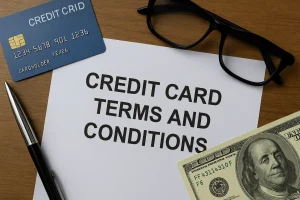In today’s financial landscape, understanding the role of consumer credit is crucial for not only individual prosperity but also for the overall health of the American economy. Consumer credit, primarily in the form of credit cards and personal loans, facilitates consumer spending, which in turn drives economic growth.
Anúncios
However, its potential benefits come with risks that need to be managed prudently. In this blog post, we’ll explore how integral credit is to the U.S. economy and provide guidance on how to manage it effectively. By doing so, individuals can make informed decisions that contribute to their financial well-being and the economy’s stability.
The role of consumer credit in the economy

Consumer credit is an essential component of economic development in the United States. By enabling consumers to purchase goods and services beyond their immediate financial means, credit supports business growth and increases market liquidity.
The availability of revolving and installment credit lines allows individuals to engage in transactions that spur economic activity. This interconnectedness is vital as consumer expenditures represent a significant portion of the Gross Domestic Product (GDP), making them a key driver of economic expansion and resilience.
The relationship between consumer credit and economic health is cyclical. During economic booms, credit availability typically expands, fostering greater consumer spending. This spending generates increased demand for products and services, which can lead to more job opportunities and higher wages.
Conversely, in times of economic downturns, credit becomes scarce, and consumers may reduce spending due to uncertain financial conditions. By maintaining a prudent approach to credit management, consumers can help stabilize these economic cycles, ensuring a more consistent and resilient economy for all people.
The impact on consumer behavior
Credit access significantly influences consumer purchasing habits. With the ability to finance purchases, individuals are more likely to make bigger-ticket transactions that they might otherwise delay. This capacity alters consumption patterns, often leading to increased spending and higher demand for credit-based products.
However, this behavior can carry risks if consumers do not effectively manage their debt obligations. Overreliance on credit might lead to financial strain, affecting the ability to make timely payments and causing credit scores to drop, which further affects future borrowing costs and capabilities.
Moreover, consumer confidence can fluctuate based on economic indicators and perceptions of credit availability. When consumers feel secure in their financial future, they’re more likely to use credit for discretionary spending.
The role of financial literacy
Financial literacy plays a pivotal role in helping consumers make informed decisions regarding credit use. Understanding key concepts such as interest rates, credit scores, and debt management can significantly impact how effectively individuals utilize credit.
Education around these topics should be a priority for consumers of all ages, enabling them to navigate the complexities of the credit landscape with confidence. Tools such as budgeting apps, credit monitoring services, and financial advisory services can provide valuable insights, helping consumers stay on track with their financial goals.
Comprehensive financial education fosters responsible credit use, teaching consumers to distinguish between good and bad debt. For instance, borrowing to invest in education or a home can be financially beneficial, potentially yielding long-term returns.
How to use consumer credit wisely
Effectively managing consumer credit begins with understanding your financial situation and setting clear, realistic objectives. Before taking on new credit, individuals should assess their income, expenses, and existing debt levels to determine their capacity to handle additional financial obligations.
By establishing a budget, consumers can monitor expenditures, ensuring that credit use aligns with their financial limits and goals. This proactive approach helps prevent the accumulation of high-interest debt, fostering a sustainable credit relationship that supports long-term financial security.
One of the key strategies for wise credit usage is maintaining a positive credit score, as it influences borrowing costs and terms. Regularly reviewing credit reports for accuracy and understanding the factors that impact credit scoring can empower consumers to take steps to enhance their credit profiles.
Staying informed and vigilant
In the dynamic world of consumer finance, staying informed is crucial for successful credit management. Keeping abreast of changes in interest rates, credit policies, and economic conditions helps consumers adapt their strategies to suit evolving circumstances.
Regularly reviewing statements and understanding credit product terms can prevent unexpected surprises and empower consumers to make prompt, informed decisions. When uncertainties or challenges arise, consulting with financial advisors or utilizing educational resources can provide clarity and guidance, ensuring effective credit management remains a consistent priority.
Consumers should also be vigilant against credit fraud and identity theft, which can undermine financial security and credit standing. Utilizing protective measures such as credit freezes, fraud alerts, and encrypted online payments are effective ways to safeguard personal information.






